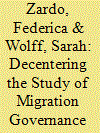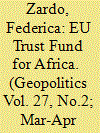| Srl | Item |
| 1 |
ID:
189104


|
|
|
|
|
| Summary/Abstract |
To what extent can a decentred approach improve our understanding of migration governance? In the field of public policy, it ‘highlights the diverse and contingent meanings that inform the actions of the individuals involved in all kinds of practices of rule’ (Bevir Citation2016, 232). In this special issue we engage indeed not only with decentring the institutions and actors involved, but also the meanings produced, narratives constructed as well as the practices they entail. Applied to the context of international relations and political geography, decentring pays attention to actors´ perceptions and practices that shape the negotiation process (El Qadim Citation2018; İşleyen Citation2018b). It also normatively engages with deconstructing dominant assumptions in the study of world politics (Bilgin Citation2017). In their call for a paradigm shift in the study of the European Union (EU)’s international relations, Fisher Onar and Nicolaïdis argue that decentring involves, first, unpacking “the social scientific categories, assumptions and paradigm that underpin Eurocentric truth claims” and then “engaging with the assumptions and worldviews that underpin others’ accounts” (Onar and Nicolaïdis Citation2013, 286).
|
|
|
|
|
|
|
|
|
|
|
|
|
|
|
|
| 2 |
ID:
184335


|
|
|
|
|
| Summary/Abstract |
As a response to the migration crisis, the EU has not only revised its policies but also mobilized resources, introduced new tools, or adapted the existing ones to the changing context. While the debate at the policy level is burgeoning, instruments have been limitedly explored. What kind of geopolitical dynamics are EU migration policy instruments producing? How do they contribute to redesigning the EU-African geopolitical space? The article combines a policy instruments approach with a spatial perspective on the EU migration policy. Through the analysis of the 2015 EU Emergency Trust Fund for Africa, it raises the argument that migration policy instruments are powerful spatial practices that are shaping the EU-African geopolitical space by coordinating the EU’s and Member States’ priorities and understandings of migration. Overall, the paper suggests that research on the EU external relations, particularly in the realm of migration, should not only pay more attention to policy instruments but also map them in the targeted territories to avoid “cartographic traps” and better understand the impact of the policies under scrutiny.
|
|
|
|
|
|
|
|
|
|
|
|
|
|
|
|